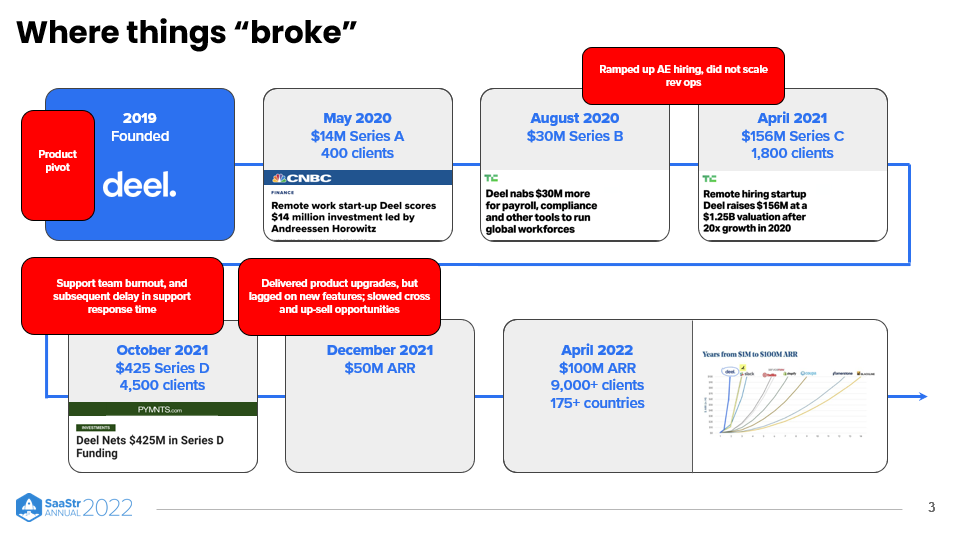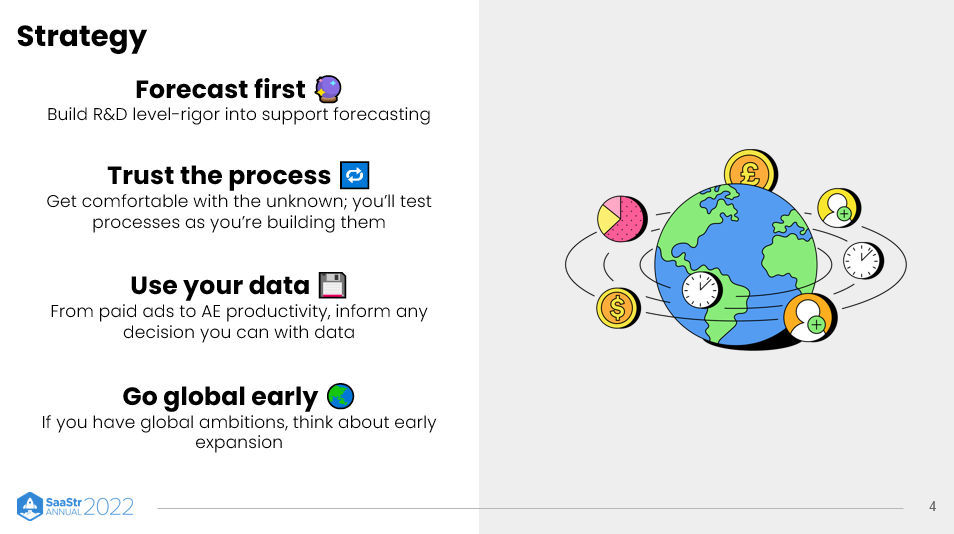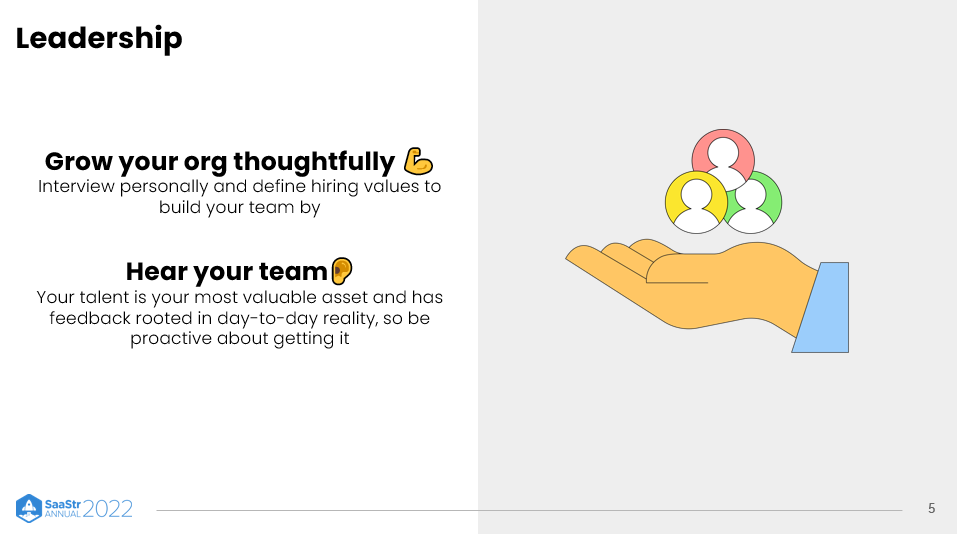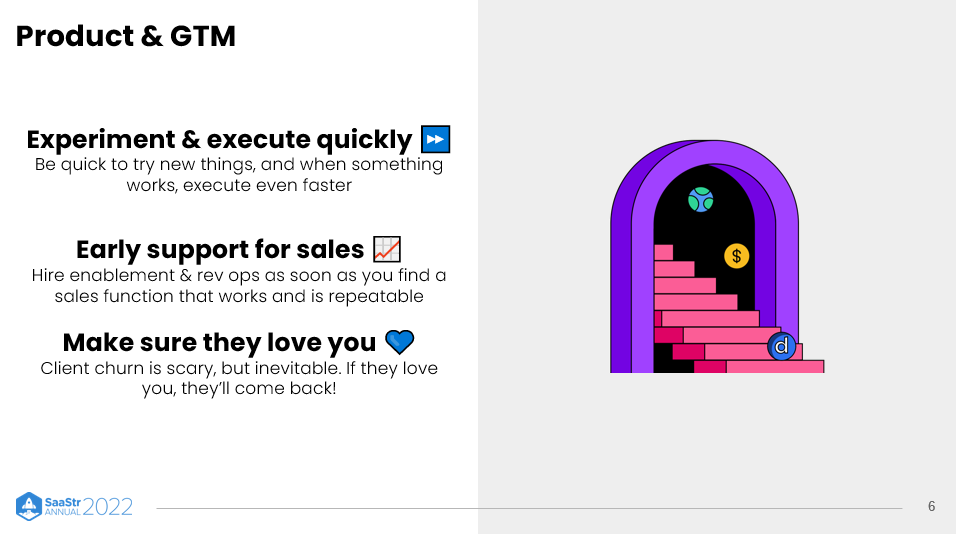When we look at SaaS companies’ success stories, everything looks great on their growth maps. However, the truth is that every company has tried, failed, and restarted before getting to success. Shuo Wang is the CRO and co-founder of Deel, one of the fastest-growing SaaS companies. She shares the challenges faced at critical stages of the company’s growth journey, the lessons learned, and how they grew to $100 million ARR in just 20 months.
Overcoming challenges by optimizing for success

In the early stages of setting up your SaaS business, it’s always a good idea to invest time thinking about the direction you want to take. Deel, for instance, recognized that remote work was a big challenge at the time, and there was also a massive talent shortage locally. They focused on building a payment platform that empowers international talent and independent contractors to get paid on time in a compliant way while also ensuring that companies can hire international talent and make payments efficiently.
Identifying a direction is just the starting point. The path to success is filled with challenges at every milestone. Deel overcame these challenges by taking care of these four things:
Finding a product focus
When Deel got accepted by Y Combinator in 2019, everyone loved the idea but hated the product. To solve this, Deel interviewed 200 founders seeking answers to the question, “If you’re open to hiring internationally and remotely, what are your biggest challenges, and what kind of product can we build to solve them?” They learned that many company founders were HR leaders who needed help managing complicated local labor laws. This insight led Deel to focus on solving payments and compliance.
Building revenue operations to support sales
Deel had onboarded nearly 100 clients, reports showed good traction, and it was time to leverage this opportunity. Deel scaled the sales team from two to 250 account executives, but issues with productivity and enablement of the account executives cropped up. Deel solved this by scaling the revenue operations team in conjunction to support sales, design quotas, and go-to-market strategies, and leverage data to identify the best strategies.

Delivering the best customer experience
With the surge in inbound leads, the business was growing exponentially. Without headcount planning for the support team, the company’s response time and customer satisfaction scores dipped. As a result, the decision to scale the support team to support demand and deliver the best customer experience possible was crucial.
Optimizing for revenue potential
Deel recognized that many clients didn’t know about its other product offerings. To tap into this revenue potential, Deel grew the account management team so managers could reach out to clients, share products, upsell, and cross-sell. With the growth of account management, Deel grew the business from 50 million ARR in December 2021 to 100 million ARR by the first quarter of 2022.
Learnings from the growth stage
Measure what you can. As a startup, it’s hard to know if the timing is right and what to expect. But through all the uncertainties, finding ways to measure the certainties is essential. Forecasting can help define revenue numbers, the support you need to provide, headcounts, and opportunities to tap into new businesses.
Use your data to inform. From paid ads to account executive productivity, inform any decision you can with data. Manage scaling issues by using data to plan ahead and being team and customer-obsessed.
Trust the process. Get comfortable with the unknown. You’ll test and build processes as you grow. Although it may slow down growth initially, it’s a good foundation to scale the team in the long run.
Go global. Finally, if you have global ambitions, think about early expansion. Expanding your footprint opens doors to multiple markets and opportunities to introduce your product. You may have a one-person representative in each continent who does the job of an SDR, closes deals, takes care of partnerships, marketing, and more. The size of your team is inconsequential when you’ve found a product market fit and can demonstrably grow your business.
“If you find a product market fit, take your business global early.”

Lessons in leadership
Grow your organization thoughtfully. Interview personally and define hiring values to build your team. Getting the product right is important, but building strong engineering, product, and sales teams is critical. As a CRO, you’re responsible for making money for the company and can oversee the most efficient way to drive revenue. You will be able to leverage the best strategies for the go-to-market function.
Listen to your team. As a founder, consider personally interviewing your first 100+ hires to ensure they are culturally aligned—even more critical in a fully remote organization. Once onboard, get regular input from your sales, support, and customer success teams. They are on the front lines, and their feedback is directly correlated with your product roadmap.
“Your talent is your most valuable asset. Their feedback is rooted in day-to-day reality, so be proactive about getting it.”

Key takeaways
- Fail fast. Experiment, find solutions, and execute quickly. Be quick to try new things, and when something works, execute even faster.
- Support sales early. Hire enablement and revenue operations as soon as you find a sales function that works and is repeatable.
- Make sure clients love you. Client churn is scary but inevitable. But there’s no reason to be nervous about it. If they love you, they’ll return or recommend you to other businesses.
- Go global early. If your product can benefit global clients, take it to where your customers are. Expanding your global footprint will help you hit $100 million ARR faster.
- Make strategic decisions and leverage your data. Data is the foundation for developing efficient strategies.
- Set clear milestones and targets together. Revenue milestones are exciting but come with unexpected challenges. Running a startup is unpredictable, but you can go far as long as you trust the team, work together, and empower everyone to solve the problem together.
The post $1M to $100M in 20 Months, The Hard Part: How Everything Breaks in Hypergrowth with Deel Co-Founder & CRO Shuo Wang (Video) appeared first on SaaStr.
via https://www.aiupnow.com
Amelia Ibarra, Khareem Sudlow
